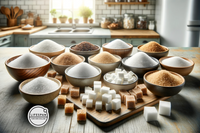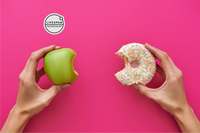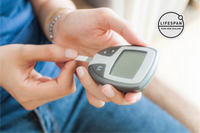
Introducing Dahlia4: Natural Blood Glucose Support
Developed by Otago University, Dahlia4 is a groundbreaking natural supplement for managing blood glucose levels. Combining the best of nature and science, it offers a safe and effective way to support your health.
Why Dahlia4?
Natural Ingredients: Carefully selected for their synergistic effects on blood glucose.
Scientifically Proven: Rigorously tested for efficacy and safety.
Holistic Health: Aids in overall well-being when used alongside a balanced diet and exercise.
Dahlia4 is more than a supplement; it's a step towards a healthier, more balanced life. Experience the natural way to manage your blood glucose with Dahlia4.
Recent posts

About the Author
Lifespan NZ, bolstered by over 60 years of experience, features a team of experts including Ben Winters, a key member and the author of our insightful blogs. Specialising in refining extracts from a diverse range of natural sources and well-versed in farming practices, our team's expertise was a pivotal reason why Otago University chose Lifespan NZ to develop a unique, research-backed blood sugar supplement, into an end product.

Are Certain Types of Sugars Healthier Than Others?
By Ben Winters
Sugar is everywhere, from your favorite snacks to the so-called healthy foods.
But here's something you might find puzzling: not all sugars are created equal. Some are natural allies in your health journey, while others are culprits in disguise. So, how do you tell them apart?
This guide is here to demystify sugar in all its forms, helping you make informed choices for your health and wellness.
You would have heard it countless times: "Avoid too much sugar." It used to be fats and sodium that were the bad guys in the food arena, and now sugar has joined them, by being highlighted as a contributing factor to many health issues.
But have you ever found yourself puzzled in the supermarket, wondering if the rules apply to all kinds of sugar?
From fruits to cakes, to fizzy drinks, sugar takes many forms, and understanding the differences can be more important than you might think.
Why? Because not all sugars affect your health the same way. Some sugars can spike your blood sugar levels dramatically, while others don't hit your system as hard. This matters a lot, especially if you're keeping an eye on conditions such as diabetes, or if you are simply trying to make healthier choices.
In this straightforward guide, we're diving into the sweet world of sugars. You'll learn how they impact your health, blood sugar, and even your weight loss efforts.
It's not just about cutting down on sweet treats; it's about knowing which types of sugars okay and which ones are to avoid.
So, let's cut through the confusion and get to the heart of the matter. By the end of this, you'll be making smarter sugar choices without scratching your head in the supermarket.
Ready to become a sugar-smart shopper? Let’s get started!
Blood Sugar Levels: Understanding the Basics.
Before we jump into the types of sugars, let's talk about blood sugar. What is it?Simply put, it's the amount of sugar in your bloodstream that your body uses for energy. Your blood sugar level is a key factor in your energy, mood, and overall health.
When you eat, your body turns food into glucose, a type of sugar that fuels your body's cells. Foods high in quick-release sugars flood your bloodstream with glucose, causing a 'sugar rush,' followed by the inevitable crash.
This rollercoaster can lead to mood swings, fatigue, and difficulty concentrating.But not all sugars you eat affect your blood glucose the same way, and that's where many health issues, including diabetes and prediabetes, come into play.
The Science of Sugar and Blood Glucose Regulation.
Your body processes sugars differently. Some are like a jolt of energy, causing rapid spikes in blood glucose, while others are more like a slow burn.
These spikes, while they can be great if you want a quick energy boost, can lead to serious health problems over time, especially frequent ones caused by certain sugars.
But not all sugars send you on this wild ride.
Complex carbohydrates, like those in whole grains, vegetables, fruits, and foods that are not highly processed, break down into glucose at a slower pace, providing steady, long-lasting energy without the harsh ups and downs.
They prevent the sharp spikes in blood sugar levels that can strain your body, wearing out your insulin-producing cells and potentially paving a path toward diabetes and heart issues. Understanding this will help you pick your sugars wisely.
Diabetes and Prediabetes: The Sugar Connection.
It's a misconception that sugar directly causes diabetes. However, indulging in sugary foods can lead to weight gain, and that extra weight makes it harder for your body to regulate blood sugar, increasing your risk for diabetes.
So, it is important to remember, to remain healthy, or regain health, it is not only the quantity of sugar in your diet, it is also the type of sugar you are consuming and how it affects your blood glucose levels.
Especially for prediabetes, when blood sugar levels are already higher than normal, the type of sugar you consume can make a significant difference in whether you cross the line into diabetes.
Identifying Sugars That Diabetics Should Approach with Caution. Living with diabetes, or prediabetes, doesn't mean you must abandon sugar altogether, but it does require a more cautious approach.
The key lies in understanding the sugars that can cause rapid spikes in your blood glucose levels and knowing how to carefully incorporate them into your diet.
Refined sugars and simple carbohydrates should be avoided. Products like white bread, regular pasta, and especially sugary snacks (think candies, cookies, cakes) contain refined sugars and simple carbohydrates.
These substances can cause abrupt spikes in blood sugar. They are digested quickly by the body, flooding the bloodstream with glucose.
For someone with diabetes, it's best to limit these types of foods or avoid them altogether in favor of complex carbohydrates and natural sugars that are digested more slowly.

For the same reasons sugary drinks should be avoided.
Beverages such as fizzy drinks, sweetened teas, and fruit juices and drinks with added sugars are particularly harmful for diabetics.
They raise blood sugar quickly and can contribute significantly to weight gain, a major risk factor for worsening diabetes. Opting for water, unsweetened tea or coffee, instead of sugary drinks is a healthier choice for maintaining stable blood glucose levels.
Hidden sugars are those that are found in products that you don’t necessarily expect to contain sugar. Certain condiments, like tomato sauce, barbecue sauce, and salad dressings, can contain surprisingly high amounts of sugar.
The same goes for breakfast cereals, flavored yoghurts, and processed foods. Reading labels can help you spot hidden sugars. Look for words like "syrup," "sweetener," and anything ending in "-ose" (like fructose or sucrose) - these are sugars in disguise.
Artificial sweeteners don't directly increase blood sugar levels, but they can affect your body's insulin response.
Some studies suggest they might worsen insulin sensitivity or even provoke cravings for real sugar, though research in this area is ongoing.
They are not a direct risk, but they might complicate your dietary habits and glucose management.
The key for those with diabetes isn't to cut out all sugar but to understand which types (and specific foods) present the greatest risk to their blood glucose stability.
Replacing high-glycemic options with low-glycemic foods, rich in fiber, healthy fats, and proteins, can mitigate these risks. Examples include whole grains, nuts, and legumes, along with fresh fruits and vegetables in moderation.
By identifying and understanding these riskier sugars, individuals with diabetes can more confidently navigate their dietary choices, contributing to better blood glucose management and overall health.
Health Implications: Are All Sugars Created Equal?
When it comes to your health, sugars aren't just about sweetness; they're about substances that can impact your body in several ways.
The simple answer? No, all sugars are not created equal. Here's why that's a critical distinction.
Natural sugars, those found in fruits (fructose) and dairy products (lactose), aren't the same as the sugars added to sweeten your coffee or the ones present in a can of fizzy drink (sucrose).
When you consume fruits and dairy, you're not just ingesting sugar. You're eating a package of nutrients that your body needs.
For instance, fruits are rich in vitamins, minerals, and dietary fiber, while dairy products contain calcium and vitamin D.
These beneficial components help slow down sugar absorption into your bloodstream, providing a more stable source of energy and preventing the sudden spikes and drops in blood sugar levels that can lead to irritability, fatigue, and cravings for more sugar.
On the other hand, added sugars (like those in candy, baked goods, and many processed foods) are empty calories.
They provide no nutritional value and are quickly absorbed into your bloodstream because they don’t have the additional natural components that require digestion.
As a result, they can cause rapid fluctuations in your blood sugar levels and lead to a 'crash' in energy. Consistently high intake of added sugars has been linked to an array of health issues.
It's a key contributor to obesity, a risk factor for high blood pressure, heart disease, and type 2 diabetes. It can also lead to inflammation throughout your body, an increase in triglycerides (a type of fat found in your blood), and higher "bad" LDL cholesterol, while decreasing the "good" HDL cholesterol.
In addition, there's growing evidence that excessive sugar consumption may influence cognitive health.
Studies suggest a high intake of sugar could impact memory and brain function, and there's ongoing research into the potential link between sugar and the risk of Alzheimer’s disease.
Understanding these differences is crucial.
Opting for natural sugars over added sugars can contribute to a balanced diet, provide the energy we need to function daily, and protect us from the health risks associated with sugar overconsumption.
Tips for Managing Sugar Cravings While Losing Weight.
Curbing sugar cravings is often easier said than done, especially when you're focused on losing weight. First, don't buy into the "sugar-free" hype. Many products replace sugar with artificial sweeteners that can make you crave more sweets.
Instead, curb cravings with healthy snacks, stay hydrated, and don't skip meals.
Sugar can hijack the brain's reward pathway, leading to a cycle of cravings and indulgence.
Breaking this cycle requires a strategic approach that involves both mind and body.
Here are some effective strategies:
Incorporate Natural Sweetness: Instead of reaching for sugar-laden snacks, choose natural alternatives to satisfy your sweet tooth.
Fresh fruits like berries or apples provide sweetness along with essential nutrients and fiber, making them a healthy way to curb cravings.
Stay Hydrated: Sometimes, our bodies can confuse dehydration with hunger or cravings.
Drinking water throughout the day can keep you hydrated and reduce sugar cravings.
If you need some flavor, infuse your water with slices of fruits like lemon, cucumber, or strawberries.
Opt for Whole Foods: Highly processed foods often contain added sugars that can heighten cravings.
Whole foods like vegetables, fruits, lean proteins, and healthy fats are naturally free from added sugars and help maintain stable blood sugar levels, which can decrease the urge for a sugar fix.
Check for Deficiencies: Cravings can sometimes be a sign of nutrient deficiencies. For example, a craving for chocolate can indicate a magnesium deficiency. Ensuring your diet is rich in essential vitamins and minerals may help reduce specific cravings.
Balanced Meals: Consuming meals balanced with proteins, fats, and fiber can slow the absorption of sugar into your bloodstream and reduce cravings. They help by keeping you full longer and stabilizing blood sugar levels.
Mindful Eating: Pay attention to what you eat and savor each bite. Eating mindfully involves slowing down and enjoying your food, which can help prevent mindless snacking and reduce the likelihood of giving in to sugar cravings.
Manage Stress: Stress can lead to emotional eating, with many people turning to sugary comfort foods.
Techniques like meditation, regular exercise, and adequate sleep can help manage stress levels, potentially reducing the frequency and intensity of cravings.
Read Food Labels: Many processed foods contain hidden sugars. By becoming more aware of these and choosing products with lower sugar content, you can reduce your overall sugar intake, making cravings easier to manage.
By integrating these practices into your daily routine, you can manage sugar cravings more effectively, aiding your weight loss efforts and leading to a healthier lifestyle.
It's about creating an environment where healthier choices are easier to make, rather than relying solely on willpower.
What matters most is making informed choices.
Now that you're armed with this knowledge, you're all set to make sugar choices that work for you and your health goals.





